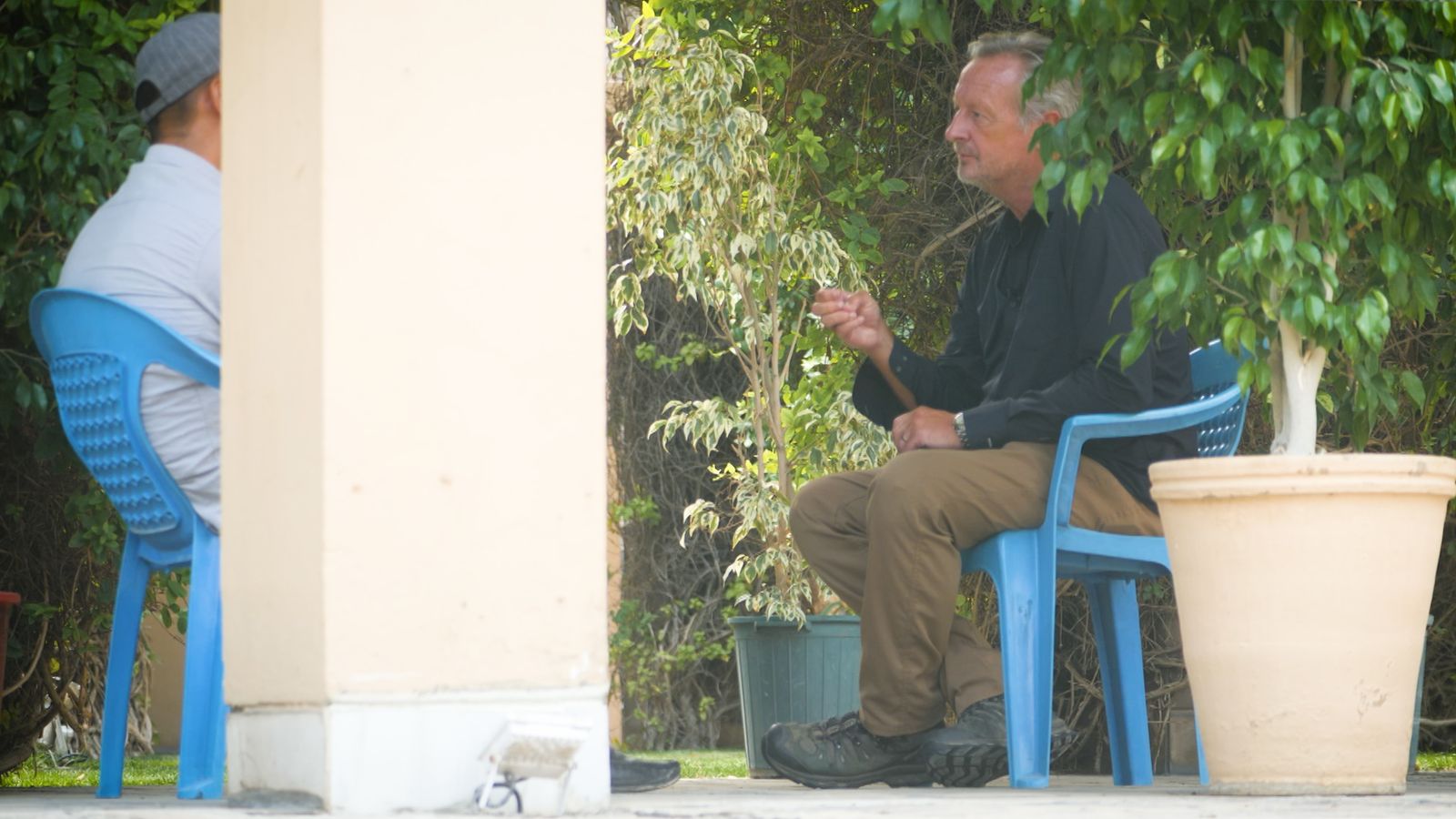For two decades, the side road to the Abbey Gate entrance to Kabul’s international airport was restricted.
For nine crazy days, it was filled with tens of thousands trying to escape Afghanistan.
Today it’s restricted once again – it’s deadly quiet.
We drove from the airport terminal along the dusty road that led to the British evacuation processing centre, based at the Baron Hotel.
On our left side, a series of blast walls that secured the runway are still there; so are the gaps where desperate refugees ripped holes in the concrete and pulled down coiled barbed wire to throw their children into the arms of relatives and soldiers above them, in the hope of finding sanctuary.
At a Taliban checkpoint, 100m short of the gates of the Baron, a guard stopped our progress.
That checkpoint didn’t exist a year ago.
We explained we needed to see the Baron. He didn’t have a clue what on earth we were doing, but eventually let us through.
At the gates we stopped. The four of us had spent days filming the desperate plight of people trying to escape, engulfed in a heaving mass of humanity.
We stopped where we watched people crushed to death, passing out from dehydration and hunger – and we stopped where a suicide bomb exploded in a canal – killing at least 170 Afghans and 13 US marines, bringing this dreadful episode to an effective end.
We stopped and remembered those days one year ago, and we thought of those who were left behind.
Read more:
Carnage in Kabul – how the attacks unfolded
Today I met one of those people.
We won’t name him for his safety, but he served five years at Camp Bastion in Helmand Province for the British military.
He spent three days and three nights in the crowds outside the Baron, and finally gave up when the IS-K suicide bomber struck in the canal. He was just 100m away with his wife and two young children.
He has been in hiding ever since, moving from location to location every month, his life in a permanent state of limbo.
Subscribe to Out Of Afghanistan on Apple Podcasts, Spotify, Spreaker
“My life has now become hell, I don’t know what we should do, where I can go, where I can tell people to help me, whose helping?” he said, speaking to me at an undisclosed location in the capital.
“I just want to say please tell the world, UK government, people of UK, soldiers of UK, that I worked with them for five years.
“I spent my life, I sacrificed everything for them, shoulder by shoulder I was working with them even in bad situations I was with the UK, in Helmand Province in Afghanistan.
“I want to request from all around the world, with the ARAP cases, please just look for my case and get me out from this hell.”
His Afghan Relocations and Assistance Policy (ARAP) application is in, and he has a case reference number, but he is still waiting for final approval, and news of a plan to extract him.
“One month ago I asked them to send me an update, but they just say wait, wait, wait…”
He is confused by the delay, he feels abandoned, and overshadowed by another war.
“What is the difference between my blood – Afghan blood – and Ukraine blood?” he asks.
“The UK did give Ukraine 100,000 visas for them when they were at war for one month, and still one year later for me… why are they doing this to me?”
He says he is physically and mentally exhausted, and his wife has never recovered from the trauma of the bomb attack.
His seven-year-old daughter constantly asks him why he’s not happy, but she is too young to understand the jeopardy the family remains in.
Read more:
Taliban still celebrating victory one year on
These children could be treated – but doctors struggle to keep them alive
Please use Chrome browser for a more accessible video player
‘They don’t care about me’
One year ago, Sky News did what we could to help as many people as possible, and like many other news organisations, we managed to get people out.
Exactly one year on, that sense of the need to try to help again overwhelmed all of us.
When I promised we would do what we could to get his case looked at by the British government, his facade of composure crumbled, and he broke down in tears.
“Seriously my heart is bleeding for my children, for my life, I don’t know what’s happening the next day, the next year, the next … tomorrow,” he said, choking back tears and apologising for his lack of composure.
“I love my family so much, but now I can’t do anything.
“I don’t know what to do for my life, for my family, what we are doing, why they don’t help us, many requests, many emails, many everything.
“I honestly worked with them, my life spent with them, and helped with their soldiers, but they don’t care about me.”
He is not the only one who feels abandoned.
There are hundreds if not thousands like this interpreter we spoke to who are hiding in family homes, moving every month, unable to work, unable to send their children to school.
They are living in fear and waiting for instructions that may never come.








